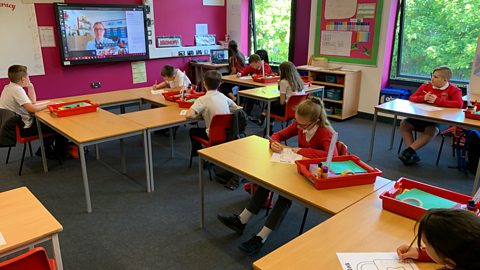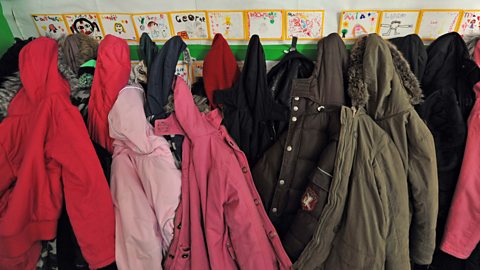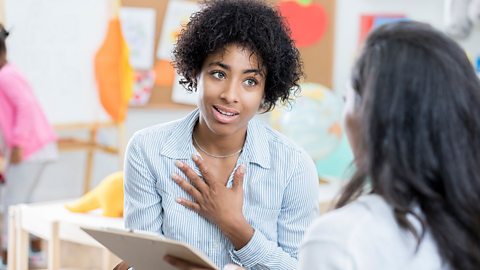
Ensuring the children are enjoying their learning and having fun is key to keeping them focussed.
The continuing disruption caused by Covid 19 in schools means work to quickly catch up with lost learning is "unrealistic", a primary school head has said.
Joanne Cartmell, head of Holy Spirit Catholic and Church of England Primary School in Wirral, has been talking about her school’s experience since pupils returned in September and giving her advice on how to manage workload and student wellbeing.
"The main difficulties in keeping children’s learning on track is the constant ‘in and out’ of school attendance," she said.
"The thread of learning is not consistent in the classrooms due to the number of children who are at home isolating at any one time."
In a recent survey of teachers, carried out by Open Data Institute (ODI), 69% of the teachers who took part said at least a fifth of their class were behind in learning with 44% reporting a third or more of their class were behind.
"As well as trying to continue with new learning for their current academic year group, teachers also have the enormous task of teaching an additional five months of lost learning," Joanne Cartmell said.
"This is resulting in an ever-tighter timetable with an inevitable narrowing of the curriculum to give way to extra intervention for core skills within English and mathematics."

Teacher tips for supporting pupils and staff
"The best advice I could give to teachers at the moment, although easier said than done, is to try not to become too overwhelmed with the task in hand," Joanne Cartmell said.
"It is important not to let children feel too pressured and to try and maintain a balance of wellbeing for the children and themselves, alongside delivering a positive, rigorous, working climate within the classroom.
"Ensuring the children are enjoying their learning and having fun is key to keeping them focussed.
"Having opportunities within the timetable for other subjects other than 'catch up curriculum' is imperative.
"Taking part in physical education, and subjects such as art can give children a change to the demands of written work.
"PSHE is also an opportunity for children to discuss and talk about issues, worries and concerns they may be experiencing but also to talk and laugh about the positive experiences.
"Laughing as we all know is good for the human soul, adults and children alike, so keeping a sense of humour and a positive outlook is also essential to wellbeing for all."

Focus on English and mathematics
The rise in cases since the return of schools in September has meant many schools have had classes isolating because of a case in their ‘bubble’ or children self-isolating at home due to a case with a family member.
A recent Ofsted report on the effects of Covid 19 found that, "In the most recent visits, more leaders talked about pupils having many gaps in their learning, or having regressed, than in the visits that took place earlier in the term."
Ofsted’s report continued, "Nearly all primary school leaders said that they were prioritising reading and mathematics, with very few schools focusing on science.
"Some also talked about needing to work on pupils’ writing, including their ‘stamina’ when writing at length.
"They felt that pupils had lost this ability during the first national lockdown, when they had not had the chance to practise their writing style and posture," the report said.
Attendance rates drop
Department for Education figures for England show the attendance rate for state schools at its lowest at 82.9% on Thursday 19 November the number had risen in the previous weeks after a drop in September.
The department's latest summary said "There has been a steady increase from 5 November in the number of schools reporting that they have had one or more pupils self-isolating, who had been asked to do so due to potential contact with a case of coronavirus inside the school.
"On Thursday 19 November, approximately 36% of state-funded schools fell into this category, up from 29% on 12 November. Note that the vast majority of these schools remain open to most pupils."
The government is funding school-to-school support for schools that need particular help including support for remote education provision. Schools are able to spend their catch-up premium on contingency planning for remote education to support pupils from falling behind in learning.
Joanne Cartmell, said her school, which was rated good by Ofsted in its last inspection, has had learning interrupted by new coronavirus outbreaks, "Teachers in our school estimate approximately 60% to 70% of children are behind academically due to Covid 19 and this has contributed to the significant pressure on school teachers and leaders.

"We have had 138 children isolating since our return to school in September," Joanne Cartmell said.
"Earlier in the term we had four positive cases of coronavirus which resulted in the closure of two bubbles, which equated to 43 children being sent home."
She also said 95 children had been isolating due to the risk of transmission from family members.
"In total we have lost 716 days of learning since September," she said.
Supporting home learning
"When children are isolating we are providing work on Google Classroom and See-Saw.
"Teachers upload the work for the day and provide the children with objectives that match the learning in school.
"Although as I touched on earlier, the materials may not be exactly the same as they are in the classroom, as it all depends on the specific teaching input and explanation that is required from the class teacher and the level of understanding required from the child.
"We have also given extra time within the timetable to teach ‘lost’ core skills, however we have endeavoured to maintain some balance and the children are continuing with some other subject areas, although not all, as I mentioned previously."
Ofsted has suspended full inspections until January 2021 but has said whether inspections then resume will be kept under review.
For Joanne Cartmell the pandemic has had an inevitable impact on her school’s atmosphere, "It is so far removed from the usual nurturing, warm and close environment of a family school and this has an impact on the emotional wellbeing of staff and children alike," she said.
"I am exceptionally proud of the staff in our school and the way they are coping in these exceptionally difficult circumstances."
I am exceptionally proud of the staff in our school and the way they are coping in these exceptionally difficult circumstances.

Learning support from ¥ÛœÛ¥´√Ω Teach and Bitesize
Help for teachers, pupils and parents during Covid-19
Live Lessons: Autumn 2020
New lessons for autumn 2020 designed to support children in catching up on literacy and numeracy as they return to school after lockdown.
A special science-themed Live Lesson on 7 December from Chester Zoo
Learning at home
Videos, quizzes and practice activities to help keep on track when learning at home.


Scaling back screen time. document
Emma Selby, clinical specialist nurse in children's mental health, shares tips on what parents and young people can do to scale back screen time.

Bouncing back to school: Five ways to support children's wellbeing
Tips on helping children to deal with unusual times

Teacher Support Articles. collection
All our articles for teachers in one place, sharing peer-to-peer advice and personal experiences.
